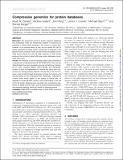| dc.contributor.author | Daniels, Noah M. | |
| dc.contributor.author | Gallant, Andrew | |
| dc.contributor.author | Peng, Jian | |
| dc.contributor.author | Cowen, Lenore J. | |
| dc.contributor.author | Baym, Michael Hartmann | |
| dc.contributor.author | Berger Leighton, Bonnie | |
| dc.date.accessioned | 2016-08-26T18:03:39Z | |
| dc.date.available | 2016-08-26T18:03:39Z | |
| dc.date.issued | 2013-06 | |
| dc.identifier.issn | 1367-4803 | |
| dc.identifier.issn | 1460-2059 | |
| dc.identifier.uri | http://hdl.handle.net/1721.1/104045 | |
| dc.description.abstract | Motivation: The exponential growth of protein sequence databases has increasingly made the fundamental question of searching for homologs a computational bottleneck. The amount of unique data, however, is not growing nearly as fast; we can exploit this fact to greatly accelerate homology search. Acceleration of programs in the popular PSI/DELTA-BLAST family of tools will not only speed-up homology search directly but also the huge collection of other current programs that primarily interact with large protein databases via precisely these tools.
Results: We introduce a suite of homology search tools, powered by compressively accelerated protein BLAST (CaBLASTP), which are significantly faster than and comparably accurate with all known state-of-the-art tools, including HHblits, DELTA-BLAST and PSI-BLAST. Further, our tools are implemented in a manner that allows direct substitution into existing analysis pipelines. The key idea is that we introduce a local similarity-based compression scheme that allows us to operate directly on the compressed data. Importantly, CaBLASTP’s runtime scales almost linearly in the amount of unique data, as opposed to current BLASTP variants, which scale linearly in the size of the full protein database being searched. Our compressive algorithms will speed-up many tasks, such as protein structure prediction and orthology mapping, which rely heavily on homology search. | en_US |
| dc.description.sponsorship | Simons Foundation | en_US |
| dc.description.sponsorship | National Institutes of Health (U.S.) (NIH grant (R01GM080330)) | en_US |
| dc.description.sponsorship | National Science Foundation (U.S.) (NSF MSPRF grant) | en_US |
| dc.language.iso | en_US | |
| dc.publisher | Oxford University Press | en_US |
| dc.relation.isversionof | http://dx.doi.org/10.1093/bioinformatics/btt214 | en_US |
| dc.rights | Creative Commons Attribution-NonCommercial 3.0 Unported licence | en_US |
| dc.rights.uri | http://creativecommons.org/licenses/by-nc/3.0/ | en_US |
| dc.source | Oxford University Press | en_US |
| dc.title | Compressive genomics for protein databases | en_US |
| dc.type | Article | en_US |
| dc.identifier.citation | Daniels, N. M., A. Gallant, J. Peng, L. J. Cowen, M. Baym, and B. Berger. “Compressive Genomics for Protein Databases.” Bioinformatics 29, no. 13 (June 21, 2013): i283–i290. | en_US |
| dc.contributor.department | Massachusetts Institute of Technology. Computer Science and Artificial Intelligence Laboratory | en_US |
| dc.contributor.department | Massachusetts Institute of Technology. Department of Mathematics | en_US |
| dc.contributor.mitauthor | Peng, Jian | en_US |
| dc.contributor.mitauthor | Baym, Michael Hartmann | en_US |
| dc.contributor.mitauthor | Berger Leighton, Bonnie | en_US |
| dc.relation.journal | Bioinformatics | en_US |
| dc.eprint.version | Final published version | en_US |
| dc.type.uri | http://purl.org/eprint/type/JournalArticle | en_US |
| eprint.status | http://purl.org/eprint/status/PeerReviewed | en_US |
| dspace.embargo.terms | N | en_US |
| dc.identifier.orcid | https://orcid.org/0000-0003-1303-5598 | |
| dc.identifier.orcid | https://orcid.org/0000-0002-2724-7228 | |
| mit.license | PUBLISHER_CC | en_US |
| mit.metadata.status | Complete | |

